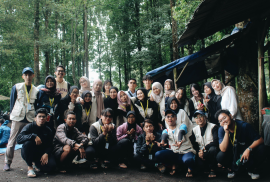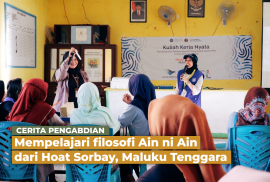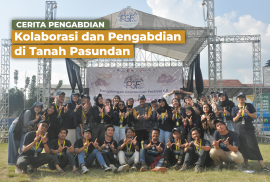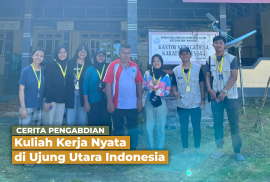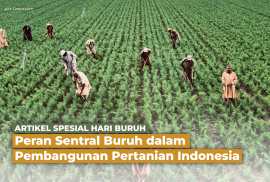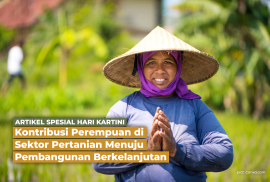Gusnia Wirdafirdaus, a student majoring in Agricultural Economics and Agribusiness class of 2021 from the Department of Agricultural Socio-Economics, Faculty of Agriculture UGM, is currently participating in a Community Service Program (KKN) in Laksana Village, Ibun Subdistrict, Bandung Regency. The KKN, which runs for 50 days from July 1 to August 19, 2024, carries the theme “Empowering Communities through Agroecology and Geothermal Energy: Innovative Strategies for Optimizing Local Resources in Tourism and Creative Economy in Ibun and Laksana Villages with a Community-Based Development Approach.”
ARTICLE
Ulin Nuha Diah Wulandari, a student of the Department of Agricultural Information and Communication, Gadjah Mada University, Yogyakarta, is conducting a 50-day Real Work School (KKN) program at Dusun Serbajadi 2, Village of Appeal, Natar Prefecture, Lampung South District, Province of Lampung. Raising the theme of “Proklim” (The Village Climate Programme), Yogyakarta UGM is focusing on the management of garbage, the movement of smoke-free dozen areas, and the development of K3 (Kebun Toga, Kolam, dan Kandang).
The Independent Campus Learning Program (MBKM) is an initiative from the Ministry of Education that allows students to take courses outside their study program and carry out activities outside campus through various learning activities. This program aims to help students develop themselves holistically. In the even semester of the 2023/2024 academic year, Class of 2021 students from the Agricultural Economics and Agribusiness Study Program (Prodi EPA) and the Agricultural Extension and Communication Study Program (Prodi PKP) participated in this MBKM program.
For Ines, a 2020 Agricultural Extension and Communication Study Program student, Real Work Lectures (KKN) is a call to contribute to society, especially in Indonesia’s Disadvantaged, Frontier, and Outermost (3T) regions. Therefore, in the KKN-PPM UGM Period 2 2023, Ines chose to carry out service in the Southeast Maluku Regency, especially in the Ohoi Dian Darat area, Hoat Sorbay District.
Ines was inspired by several of her seniors who had also served on Kei Island. The desire to see firsthand the conditions of communities outside Java, as well as the beauty of the white sand beaches on the Kei Islands, was the main trigger for Ines to choose KKN in Southeast Maluku. Moreover, the white sand beach in Kei is known as the beach with the finest white sand on the Asian continent.
Haidar, a student of the Agricultural Extension and Communication Study Program class of 2020, carried out the UGM PPM Real Work Lecture (KKN) period 2 of 2023 in Sembungan Village, Kejajar District, Wonosobo Regency, Central Java. This village is famous as the highest village on the island of Java and has a unique commodity, namely carica fruit. Haidar chose KKN in Sembungan Village because he was interested in carica fruit, which can only be grown in certain places. Apart from that, Haidar wants to gain new experience in agriculture in the highlands and enjoy the beauty of natural tourism in the area.
Real Work Lectures (KKN) has become an unforgettable journey for many students, including Happy from the Agricultural Extension and Communication Study Program class 2020. Stepping into the Nasik Strait area, Belitung Regency, Bangka Belitung Islands, Happy and her team wrote an unforgettable story of service. Divided into two sub-units, Happy found her calling in Suak Gual Village, located on the seashore. Happy’s choice to undergo KKN in Belitung was none other than her desire to experience coastal marine life, which was different from what he usually encountered on the island of Java.
Real Work Lectures (KKN PPM-UGM) continue to open the door for students to contribute to society in various corners of Indonesia. One of the inspiring stories came from Karta, a 2020 Agricultural Economics and Agribusiness Study Program student who underwent KKN in Pangalengan District, Bandung Regency, West Java. Karta chose Pangalengan as a KKN location because of its natural beauty, tourism potential, and abundant natural resources. Determined to have a positive impact on the local community, Karta joined the 2023 UGM Wayang Windu KKN-PPM Team.
Real Work Lectures (KKN) have allowed students to apply the knowledge gained in lectures and contribute to community development. One of the inspiring stories came from Nata, a 2020 Agricultural Economics and Agribusiness Study Program student who underwent KKN in Nanusa District, Talaud Islands, North Sulawesi. Nata chose this location because she wants to explore remote areas in Indonesia and deepen her understanding of the various potentials that exist. Nanusa, an area at the northern tip of Indonesia directly bordering the Philippines, challenges Nata with all its uniqueness.
Labor Day, celebrated every May 1, is a moment to honor the significant contributions of workers in various sectors, including agriculture. When the sun was dawning in different parts of Indonesia, thousands of agricultural workers began to enter the fields with unparalleled enthusiasm. From morning until dusk, they serve, plowing, planting, caring for, and harvesting the land with complete dedication. Their role not only includes physical tasks but also acts as a bridge between agricultural land and national food needs.
Commemoration of Kartini Day on April 21 every year is not only a moment to remember Kartini’s service and fighting spirit but also to reflect on the role of women in various sectors of life, including the agricultural sector. Women often hold significant roles in this sector. In agricultural commodity cultivation activities, women also contribute to planting, caring for plants, and even harvesting. Apart from that, at the post-harvest stage, women are also involved in raising livestock, processing agricultural products, and marketing products.

